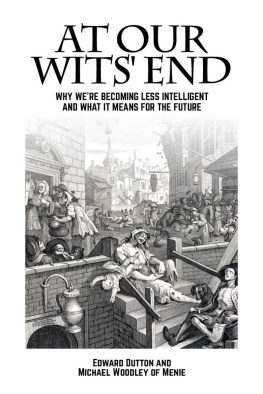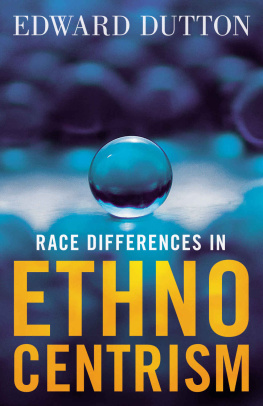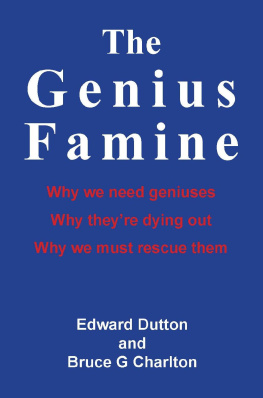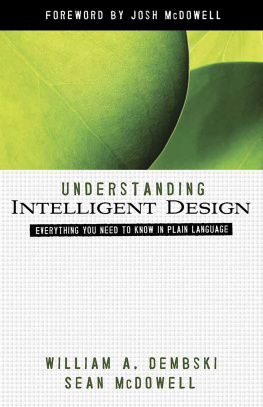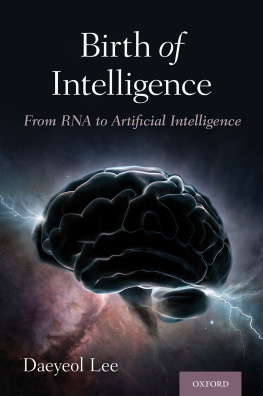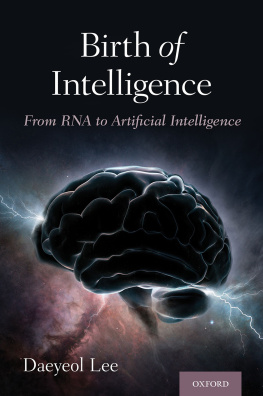Published in the UK in 2018 by
Imprint Academic
PO Box 200, Exeter EX5 5YX
www.imprint-academic.com
Copyright 2018 Edward Dutton & Michael A. Woodley of Menie
The rights of Edward Dutton & Michael A. Woodley of Menie to be identified as the authors of this work have been asserted in accordance with the Copyright, Designs and Patents Act 1998.
The moral rights of the authors have been asserted. All rights reserved. Except for the quotation of brief passages for the purposes of criticism and discussion, no part of this publication may be reproduced, stored in a retrieval system, or transmitted, in any form or by any means without the prior written permission of the publisher, nor be otherwise circulated in any form either digital or physical other than that in which it is published and without a similar condition being imposed on the subsequent purchaser. Any person who does so may be liable to criminal prosecution and civil claims for damages.
The views and opinions expressed herein belong to the author and do not necessarily reflect those of Imprint Academic or Andrews UK Limited.
They reel to and fro, and stagger like a drunken man, and are at their wits end.
Psalm 107: 27
Acknowledgements
In producing this book the authors have benefited from fruitful discussions with a number of colleagues. They would like to acknowledge the assistance of Prof. James Flynn, Prof. Aurelio-Jos Figueredo, Dr Bruce Charlton, Prof. Guy Madison and Prof. Dimitri van der Linden. Figures 2 and 3 are reproduced by kind permission of Prof. Gregory Clark. All tables cited from Lynn (2011) are reproduced by kind permission of the Ulster Institute for Social Research, London.
One
Can You Believe We Put a Man on the Moon?
Its incredible to think that in the year 2000 you could get from London to New York in just 3-and-a-half hours. These days, it takes longer than that to fly from London to Athens.
With the advent of Concorde in 1969, we had dealt with an extremely difficult problemhow to get from A to B much faster. We had been trying to solve this problem since 1954. That was when Arnold Hall, director of the Royal Aircraft Establishment, set up a committee to look into supersonic flight. The USA was an important country. Western Europe was almost as vital. There were crucial business connections between the two regions. These were massively complicated by the 8 hours it took to fly between America and Western Europe. It wasted time. It wasted money. How could we solve this problem?
The solution was Concorde. Concorde wasnt a minor update to existing technology which made things slightly easier, like the introduction of active power-steering in BMW cars in 2003. This was a major breakthrough, comparable to the invention of aeroplanes themselves (How can we fly?) or the Spinning Jenny (How can we massively speed up production?). In the 1950s, some of the worlds most intelligent and creative people were put to work to find a solution to this enormous problem and, on 2nd March 1969, Concorde was in the sky.
It fell from the sky on 25th July 2000. Air France flight 4590 took off from Pariss Charles de Gaulle Airport and promptly smashed into a hotel, killing all 100 passengers and 9 crew, as well as 4 people on the ground. The crash was essentially due to incompetence. A titanium wear strip had been attached to the back of the thrust reverser of a Continental Airlines DC 10 Airliner as part of an operation to repair it. Not only was the wear strip badly produced, but it had not been made by the Airliners original equipment manufacturer. Accordingly, when the plane took offjust minutes before Concorde did on the same runwaythe wear strip fell off. As Concorde accelerated over this sharp bit of metal at high speed, it punctured Concordes tyre, causing rubber to spin off the wheel and break open the fuel tank. This led to a fuel leak, which in turn led to a fire, resulting in one of Concordes engines being shut down. At the speed it was going, it was committed to take off, but Concorde couldnt gain enough velocity or altitude to remain in the air. So Concorde crashed; all because an earlier aeroplane hadnt been maintained properly. There had been problems with Concorde beforesuch as part of the rudder breaking off on a 1989 flightbut never a crash. The system had always worked. The pilots, in the heat of the moment, had always realised how to save the plane; the ground crew never made any major mistakes. Public confidence was shaken and, by 2003, Concorde was permanently grounded. We were back to how it used to be. Flights between the UK and the USA were once again interminable.
1969 was also the year that we put a man on the Moon. In many ways, this may be the greatest achievement in the history of humanity to date. This was not something that developed organically and unplanned. Things naturally develop in this way if people of reasonable intelligence and conscientiousness work on them for long enough. Science fiction writers had long dreamed of going to the Moon.
Why? Why is it that we used to be able to fly from the USA to London in less than 4 hours but now we cant? Why is it that we used to be able to put people on the Moon but now, it seems, we cant? The answer is surprisingly simple. We are no longer intelligent enough to be able to do these things. We have become too stupid to keep Concorde in flight; let alone go back to the Moon.
Dont be Stupid!
Dont be stupid! you might be thinking. There are so many complex reasons why we havent been back to the Moon! The economic collapse in the 1970s, the end of the Cold War meaning there was no longer as strong an incentive to compete with the former Soviet Union, and attention turning to making life fairer for people on Earth. Its the same with Concorde. Theres been another economic collapse since then. We just havent got round to doing these things, but we could..!
Science looks for the theory that explains the most with the fewest assumptions. Named Occams Razor, after the English friar William of Occam (c.12871347), the axiom that the simplest theory is the best is accepted by all scientists. If we can plausibly explain two separate events with one theory, then that is superior to having a different theory for each event. We will show in this book that the simplest explanation, with the fewest assumptions, for our failure to get back to the Moon or to get Concorde back in the sky is that we are becoming less intelligent. Other explanations might account for one of the two events, or aspects of these, but they will not explain everything without leaving questions unanswered or assumptions hanging in the air. Our explanation does not suffer from these problems.
The Decline of Intelligence
Our argument is based on a number of foundations, each of which are controversialat least among those who are sure they know bestbut each of which we will demonstrate in the course of this book.
To understand whats going on, we have to understand what intelligence is and why its so important. Intelligence is, basically, the ability to solve complex problems and do so quickly. The quicker you can solve a problem, the cleverer you are. The cleverer you are, the more complicated the problem has to be before youre stumped. On adult samples intelligence is 0.8 heritable meaning that 80% of the variation among individuals is due to genetic factors (a heritability of one would indicate that 100% of the variation was genetic). We all know of people who arent that bright but work very hard and get top marks in their school leaving exams, but they are the minority. Its intelligence that really counts.
We will see in this book that the process of Darwinian selection acting on intelligence did not end on the African Savannah 100,000 years ago. Rather, Darwinian selection, and social selection in particularwhere Darwinian fitness stems from cooperation among or competition against other members of societycontinues into the present day, with more general evolution among humans still on-going. This process led to what the British economist Gregory Clark, who we will meet later, has termed The Survival of the Richest.
Next page
